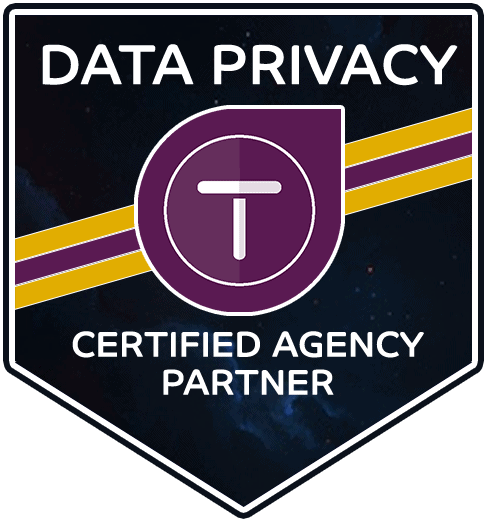This article will talk about how I use Termageddon to ease your privacy policy woes. Yes, not the most fun of topics, but an important one nonetheless!
**cue hooded figure typing at 1000 words per minute on a computer**


I recently became a Certified Data Privacy Agency Partner with Termageddon. I was quizzed on my knowledge of data privacy, and fortunately, I passed with flying colors.
Does your business have a privacy policy in place? When you’re brainstorming the pages that you need for a website, you may overlook the fact that you need a privacy policy on your website. Here are some common objections that I hear:
- My website is a one page brochure-style website, so I don’t need one!
- I don’t do business in Europe, so privacy laws in Europe don’t matter to me.
- I’m not collecting any personal data!
The simple truth is that you should have a privacy policy to protect you from possible litigation down the road. Privacy laws are changing on a regular basis, and even here in the United States, individual states are enacting privacy laws that are changing the internet for everyone. The issue has been apparent for years, but as with many laws pertaining to technology, privacy laws haven’t kept up with the landscape.
Do you remember the golden era of Facebook quizzes? Just like everyone else, I had to find out which Spice girl I was. Think back to 2016 with the Cambridge-Analytics / Facebook scandal. In the mid 2010s, Cambridge Analytica was able to harvest a large amount of personal user data when these users took a quiz called “thisisyourdigitallife,” and not only were they able to harvest that user’s data but also that user’s friend’s data. This allowed a company to have access to the personal data of millions of Facebook profiles. From this big data, Cambridge Analytica was able to develop “psychographic” profiles of people, and political campaigns were able to hypertarget emotional narratives to select groups of people. A great documentary about this is The Great Hack (2019) on Netflix.
Personal data has become the most powerful asset on Earth, and privacy laws haven’t kept up with the technology. Nonetheless, we need to address privacy policies before it becomes too late.
What is a Privacy Policy?
Generally speaking, a privacy policy is a legal agreement that explains what personal information a website gathers from its users, how that personal information is used, and how it is kept safe.
Personal data includes names, addresses (both physical and email), IP addresses, telephone numbers, date of birth, and financial information, such as debit and credit card details.
In addition to outlining how a company uses the information, a privacy policy should also include how it will stay transparent to its users, and how those users sharing their data can seek recourse should the company fail to stay transparent.
Even a website having a simple form asking for a name and an email would need to have a compliant privacy policy to avoid possible fines and litigation. If you use Google Analytics on your website, you must have a privacy policy.
Why is a Privacy Policy Important?
Fines and lawsuits. We want to avoid them.
In the United States, there are already many states that have already enacted privacy laws, and many more states who have bills in committee or introduced. According to the IAPP (International Association of Privacy Professionals), there are currently 3 states with signed bills and 16 more states whose bills are in the legislative process.
There are currently four laws between the United States and the European Union that require that most websites that collect personal information to have a Privacy Policy.
- The California Online Privacy Protection Act (CalOPPA)
- The California Consumer Privacy Act (CCPA)
- Nevada’s Revised Statutes Chapter 603A and SB220
- European Union’s General Data Protection Regulation (GDPR)
These laws protect consumers of these states and countries, though not businesses. If you collect data from consumers within the European Union, California, or Nevada, you could be subject to these laws.
Privacy laws will become the norm in the next 5-10 years, and we foresee them getting more complicated down the road, not less complicated.
Writing your own Privacy Policy
Writing your own privacy policy can be problematic, because you’re probably not a lawyer and these laws are ever evolving.
Copying another business’s privacy policy doesn’t work since how a two businesses deal with data can widely vary.
Using a privacy policy generator doesn’t guarantee that the policy is actually correct and usable. There are many of these so-called “policy generators” out there that exist just to make a quick buck from unsuspecting people.
Enter Termageddon.
Termageddon was founded by a privacy and technology attorney and offers a solution for privacy policies and other common legal documents (think Terms of Service, Disclaimers, and they are even branching out to Canadian, British, and European law).
For $10/month or $99 for an annual license, you can have compliant policies that are up to date as laws change and are specifically created for your website. How though? The process is easy. It takes less than 10 minutes to go through their policy generator; you answer questions about your website and the type of data that you collect. When you’re done, you get a piece of embedded code that you can embed on your website to display the up-to-date policy.
Termaggeddon can update these policies remotely, since the policy isn’t actually hosted on your website. Since they can stay up to date with the world’s changing laws and remotely update policies for their customers, you can know that your website is compliant with privacy laws around the world.
I use Termaggeddon to protect my company, and I recommend it for all of my customers. I include it in my monthly care plans, further ensuring that my customers are well taken care of.
What’s Next?
If you don’t have a privacy policy or you are not sure if it is compliant, contact me and we can dive into it together. You can sign up for Termageddon yourself and start setting up your policies, or I can help you get set up. I know it can be stressful not knowing if your website is protected or not, but fortunately, we have a solution that is reasonably priced as the ever evolving world of privacy laws change.
Disclosure: By making a purchase through links on this page, I will receive a very small commission at no extra cost to you.
